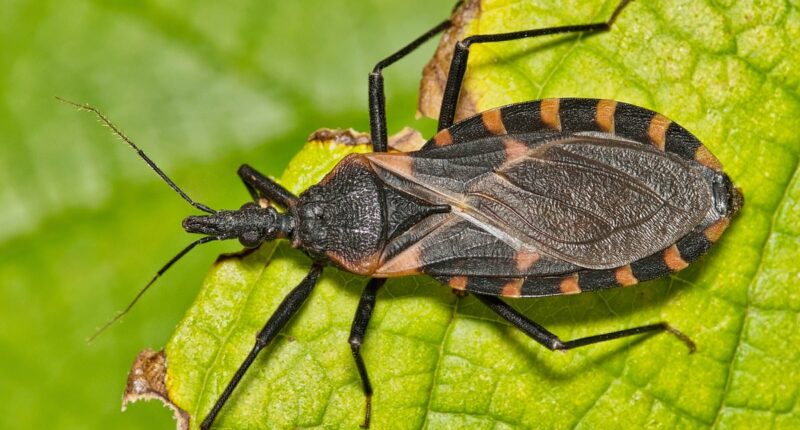Share this @internewscast.com
Bugs in the southeastern US may be spreading deadly, disease-causing parasites, experts warn.
Researchers in Florida and Texas spent 10 years tracking the transmission of Chagas disease, a dangerous condition caused by the parasite Trypanosoma cruzi.
Trypanosoma cruzi is generally transmitted through feces of triatomine bugs, nicknamed ‘kissing bugs,’ which are known to bite humans and animals.
This leads them to passing on Chagas disease, which is currently infecting about 280,000 Americans, many of whom don’t know they have it. Left untreated and living in the body for decades, it can lead to heart failure, blood clots and bowel damage.
Based on 300 kissing bugs collected in 23 Florida counties, the researchers found more than a third of them were in people’s homes.
One in three bugs tested also carried Trypanosoma cruzi and infected people and animals in more than half of the counties examined.
The team believes the bugs come into homes as more people build property on previously undeveloped land, the insects’ natural habitat.
Now, they are urging people in the 29 states where kissing bugs live – including Florida, Texas, New Mexico and Delaware – to reduce their exposure to them, which includes not keeping wood piles inside or near where pets sleep, as the bugs often are found there and can attach to pets and transfer to humans.

Triatomine bugs, nicknamed ‘kissing bugs,’ carry the parasite Trypanosoma cruzi, which causes Chagas disease
Dr Norman L Beatty, co-first author of the study and infectious disease physician at the University of Florida, said: ‘We’ve done the groundwork to show that we have a vector in our state that is harboring a parasite, invading homes and feeding on humans and our pets.’
Kissing bugs, which range from 0.5 to 1.25 inches long, are blood-feeding insects that tend to hide during the day in dark areas of homes like ceilings and cracks in the walls. They then come out to feed at night.
Study author Dr Samantha Wisely said: ‘[Triatomine bugs] are ambush predators, right? They wait for you to relax and then suck blood.’
They spread Trypanosoma cruzi when humans or animals absorb or accidentally eat the bugs’ infected feces.
Kissing bugs have been detected in 29 states, but Chagas disease is not closely tracked in the US. However, it has earned a reputation as a ‘silent killer’ because it lives in the body for decades without being detected.
The researchers in the new study, published Monday in PLOS Neglected Tropical Diseases, collected 300 kissing bugs living in or around homes and analyzed their stomach contents to determine the source of their last meal and if they had the parasite.
Of the one in three bugs living inside homes, most had been feeding on humans, whereas those outside homes had fed on other mammals, as well as reptiles and amphibians.
Infections were detected in 12 out of 23 Florida counties included in the study.
The researchers said kissing bugs may be invading homes because as Florida’s population grows, more land is required for housing.
Wisely said: ‘I think that where we have seen transmission occurring in and around homes is in this, what I would call, peri-urban setting.
‘So, it’s not quite suburbs, it’s not quite rural … we’re building into the Trypanosoma cruzi habitat, and so I think it increases the likelihood of people and companion animals becoming infected.’

The above map shows states where triatomine bugs have been detected

The above graph shows which food sources kissing bugs relied on, depending on where they were found. Bugs in homes most often fed on humans, while those outside focused on wild mammals
While many people with Chagas disease may be symptom-free, signs include fever, fatigue, body aches, headache, rash and loss of appetite.
Once it reaches the chronic phase, patients may suffer heart failure, abnormal heart rhythms, trouble eating and issues passing stool.
It can be treated with anti-parasitic medications and therapies for secondary issues like heart rhythm disorders.
Wisely said preventing Chagas infection involves keeping bugs from entering the home.
She added: ‘Don’t keep those wood piles right next to your house. Don’t keep them right next to where your dog sleeps. I think that’s a huge part of it.
‘That’s the integrated part, not just using pesticides and insecticides. … Habitat management, as well as changing your behavior.’











